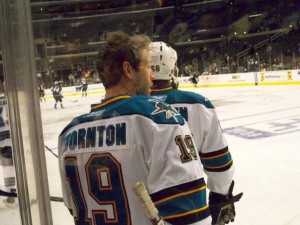Our season review on the San Jose Sharks comes to the final segment, where things get tied up neatly, if not happily. For those needing to catch up on any of the earlier subjects, they are linked below.
1. Main Points
2. Forwards
3. Defense
4. Goalies
6. Coach
All About Management
“Bad management can ruin anything”.
A former manager of mine told me that. He knew from personal experience, one of his innovations forms the basis for a company currently worth $40billion. Not the company he worked for, mind you, they sold off his innovation for less than pennies on the dollar.
Bad management ruined this season for the Sharks, and perhaps it will not end here.
It was a bad season. The 22 fewer points from last season to this season was the 2nd worst drop-off in the league (behind only Arizona). The drop in the league-wide standings of 18 spots was tied for the worst in the league (with Colorado). That step back that General Manager Doug Wilson promised; the team over-delivered.

The core problem, however, is not Doug Wilson, even though much criticism sent his way is both fair and well-earned. A rational assessment of Wilson over the years is that he is among the better general managers in the league. He did not suddenly become completely inept. The culprit is owner Hasso Plattner, who changed the culture to such a degree that Wilson no longer had an incentive to win this season. A playoff spot would have meant more development for younger players, more money into the organization and retention of a winning culture. Apparently none of those things were important to Doug Wilson this year, even though they had been important to him every other year. The boss set the course and the underling accommodated. A tale as old as time.
The bond was broken between players who play to win, the coaches who coach to win and the management group that did not appear to care about winning.
No issue highlighted the breakdown better than Brent Burns. Burns proved, repeatedly, that he simply was not nearly as good as a defenseman as he was as a forward. Many questioned the initial move, but to me the heart of the issue lies elsewhere. Mistakes get made and mistakes get corrected. In this case, only the first part happened. No one wanted to fix the mistake. Someone decided it was acceptable to sacrifice this team rather than fix the problem. Doug Wilson did not have the authority to sacrifice the season. That is too big a decision for a GM. Only the owner can make that call.
I do not trust Hasso Plattner.
On the ice, Wilson and McLellan kept to their word that younger players would have the opportunity to take a job. The younger players did play. Players with under 82 games of NHL experience entering this season accounted for roughly 30% of games played. As for the meritocracy Wilson promised, not so much. A few young players did seize jobs (Melker Karlsson and Chris Tierney), while others held jobs despite mediocre play (Brenden Dillon and Mirco Mueller). There were good seasons by top-end veterans Logan Couture, Joe Pavelski and Marc-Edouard Vlasic, along with a poor season from Patrick Marleau. There was little progress from Matt Nieto or Tomas Hertl, two young players hoping to take a major step. Both goalies were problematic.

On the ice, the most unfortunate part was seeing another quality season by Joe Thornton going to waste. He will be 36 next year, and how much longer he can perform at this high level is going to be a question asked for the remainder of his career. While there is a case to be made for other players such as Pavelski, Thornton is still the best player the Sharks have. He pretty much has been the team’s best player every season he has been a Shark. This season, he missed 4 games, 2 of the 4 games were 5 goal losses, the 2 worst losses of the entire season.
Further compounding the poor season was the manner in which it undermined now former Head Coach Todd McLellan. McLellan’s biggest challenge was attempting to remain loyal to management, to his staff and to the players. Unlike in McLellan’s other years in San Jose, this year, the management and players were on completely different pages. McLellan had to choose his loyalty and he chose the management over this year’s team. In doing so, he lost the room. Once that is gone, it is very hard to get back. For all his loyalty, McLellan’s demise seemed almost preordained. For the coach, loyalty was an asset that became a liability this year. Assets turning into liabilities, from the coach’s loyalty to Brent Burns’ defense to Patrick Marleau’s decline, was a major part of the story of the season. Good management does the opposite, it turns liabilities into assets.
A team can overcome a lot, but poor ownership is a major additional hurdle. For me, the primary emotion is one of sadness. Yes, the Sharks went through a humiliating defeat against the Los Angeles Kings last season. The Sharks were beaten by the eventual Cup winners. They were beaten on the ice by a better team. This season, the Sharks chose to beat themselves. This is an organization in trouble.
Bad management can ruin anything. Here are your San Jose Sharks.